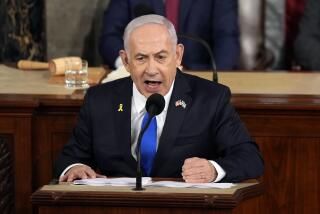Weapons Sales to Gulf States Help Stability, Administration Says : Mideast: Military weakness encouraged Iraq to attack Kuwait, Senate panel is told.
- Share via
WASHINGTON — The Bush Administration, defending its plans for major new weapons sales to Persian Gulf states, told Congress on Thursday that such deals help rather than hurt U.S. efforts to promote stability and stem weapons proliferation in the volatile Middle East.
Insufficient weapons in the hands of pro-American states helped cause the Gulf War and could set the stage for future conflicts if the issue is not addressed, Assistant Secretary of Defense Henry S. Rowen told a skeptical Senate Foreign Relations Committee.
Previous U.S. arms sales to Middle East countries, including Israel, Egypt and Saudi Arabia and some smaller Persian Gulf states, “did not contribute . . . to Iraq’s aggression. Indeed, it was the military weakness of the Gulf Arab states that encouraged Saddam (Hussein) to move against Kuwait,” Rowen said.
Undersecretary of State Reginald Bartholomew said the U.S. arms-control effort for the region will include making sure that friends of the United States have the firepower they need.
“We do not believe that arms sales are necessarily destabilizing,” Bartholomew told the committee. “We believe that the arms-sales policy of the United States has been and is today aimed at supporting our strategic objective in the region. A crucial element of this long-range process is helping our friends meet their legitimate defense and security needs.”
President Bush announced last week that he will seek agreements to eliminate weapons of mass destruction in the Middle East and to restrict the flow of conventional arms. Congressional skepticism over his plan has been fueled by announcements that the United States is giving Israel 10 F-15 fighters. It also plans to sell 20 Apache attack helicopters to the United Arab Emirates and eight Apaches to Bahrain.
Committee Chairman Claiborne Pell (D-R.I.) said that such “contradictory signals” about Mideast arms, including plans for “major sales to the region” that would “directly undercut the notion of restraint,” raise little hope for success in nonproliferation efforts.
Pell also said sales of advanced weapons to small countries such as Kuwait are counterproductive because “Iraq seized Kuwait’s weapons.” He also complained that U.S.-made F-18s previously sold to Kuwait did not prevent Iraq from invading.
Defense Secretary Dick Cheney defended the Administration policy earlier this week while touring several Middle East countries. He said the Bush initiative “did not call for an absolute, total ban on all weapons going to the Middle East. It specifically makes a provision for continuing to satisfy their own security.”
Rowen stressed that point when he told the committee Thursday that a unilateral American policy of cutting off all arms supplies to Middle East allies would “prevent us from meeting the legitimate security needs of our friends while allowing Iraq or other potential aggressors to arm unhindered.”
Bartholomew emphasized that “a complete cessation of sales to the entire (Middle East) region is not on and has never been on.”
Bartholomew, who will head a U.S. delegation to Paris next month for talks on limiting arms sales to the region, added: “We have to remember that sales are going to continue. . . .”
He also said the Administration will be proposing more arms sales in the coming months. He did not give details, but announcement of a major sale to Saudi Arabia is expected.
More to Read
Get the L.A. Times Politics newsletter
Deeply reported insights into legislation, politics and policy from Sacramento, Washington and beyond. In your inbox twice per week.
You may occasionally receive promotional content from the Los Angeles Times.










